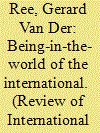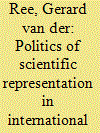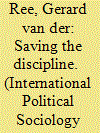|
|
|
Sort Order |
|
|
|
Items / Page
|
|
|
|
|
|
|
| Srl | Item |
| 1 |
ID:
142543


|
|
|
|
|
| Summary/Abstract |
Even though the international permeates our daily lives in many ways, it rarely discloses itself as part of our everyday engagements. Drawing from Martin Heidegger’s phenomenology, this article seeks to explore the ways in which the international remains hidden to, as well as the ways in which the international can become part of, our being-in-the-world. Additionally, it will show the terms in which International Relations (IR) scholars can disclose the world of the international, and what the implications of that ‘knowing’ are for the discipline. Finally, it will explore the possibilities and limitations of a Heidegerrian phenomenology for a social science such as IR.
|
|
|
|
|
|
|
|
|
|
|
|
|
|
|
|
| 2 |
ID:
124618


|
|
|
|
|
| Publication |
2013.
|
| Summary/Abstract |
In IR, representation of knowledge is not neutral, but follows tacit conventions that have become naturalised in the field. In many ways, these conventions are shaped by the so-called 'science question', which has shaped the field since the first debate. This article explores three ways in which knowledge is represented in the discipline: numbers, graphical models, and metaphors. Numbers and formal models reinforce the 'science question' by the ways in which they exclude audiences, objectify representation and desocialise knowledge. Metaphors also fulfil objectifying functions, particularly through the ways that they link in with 'commonsense' knowledge and academic jargon. As will be argued in the concluding section of this article, attempts to escape these logics through the linguistic turn have not been successful at overcoming the politics of scientific representation in the field, and in some ways have even sustained them.
|
|
|
|
|
|
|
|
|
|
|
|
|
|
|
|
| 3 |
ID:
132388


|
|
|
|
|
| Publication |
2014.
|
| Summary/Abstract |
For several decades, the field of International Relations theory has been preoccupied with its own methodological and theoretical plurality. As a consequence, IR scholars have proposed a range of different solutions to this "problem." In doing so, they have drawn from different sources of social capital in the field, allowing them to base their legitimacy on the ways they relate to "progress" and the status quo. Drawing from Bourdieu's sociology, this article will explore five different strategies for "saving the discipline" and show how they relate to different kinds of scientific capital and power relations in the field. It will also explore the ways in which social conventions (such as politesse) can be used as tools for symbolic violence. The article will finish by arguing that rather than a problem to be resolved, plurality functions as an organizing principle regulating social power relations in the field.
|
|
|
|
|
|
|
|
|
|
|
|
|
|
|
|
|
|
|
|
|